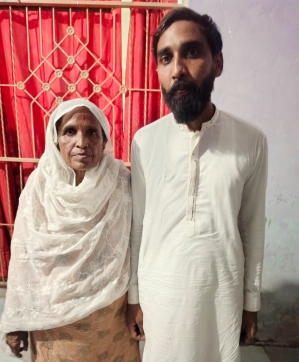
A judge in Pakistan on Thursday (June 12) acquitted a Christian of blasphemy and terrorism charges after the prosecution failed to prove its case against him, his lawyer said.
Attorney Kashif Nemat said that Sahiwal District and Sessions Judge Zia Ullah Khan, who also presides over the anti-terrorism court of Sahiwal Division, ordered the acquittal of 28-year-old Farhan Javed Masih, who was arrested and charged under blasphemy and terrorism charges by Sahiwal’s Ghala Mandi police on Jan. 26 for allegedly speaking against Islam and the religion’s sacred figures.
Police had registered a case against Masih under sections 295-A and 298-A of the blasphemy statutes and Section 7 of the Anti-Terrorism Act (ATA) on the complaint of a local Muslim villager, Muhammad Bilal Khan, Nemat said.
“Masih, who developed mental illness due to excessive use of synthetic drugs, was entrapped in the false accusation by the complainant because his younger brother Jamal Khan was a friend of the Christian and they used to do drugs together,” Nemat told Christian Daily International-Morning Star News. “Bilal Khan basically wanted to break their friendship, which is why he concocted the blasphemy allegation against Masih.”
Section 295-A calls for imprisonment of up to 10 years for deliberate and malicious acts intended to outrage religious feelings of any class by insulting its religion or religious beliefs; 298-A, with a punishment of up to 10 years in prison for disrespecting the wives and companions of Muhammad, the prophet of Islam; and Section 7 of the Anti-Terrorism Act, which includes a clause related to causing civil commotion or unrest and is punishable by a minimum five-year jail term.
The attorney said that at the onset of the trial, the judge had refused to admit the defense’s plea for conducting a mental health examination of Masih, Nemat said, adding that the judge also rejected their plea that the trial be moved from the anti-terrorism court to an ordinary court.
“In recent years, the police have started adding sections related to terrorism in blasphemy cases, which is sheer injustice with the accused,” he said. “The sessions court has the original jurisdiction to hear blasphemy cases, but now many cases are being tried by anti-terrorism courts. We have already submitted a review petition in the Lahore High Court to seek its opinion on this critical issue.”
Speaking about the grounds for Masih’s acquittal, the attorney said the judge noted glaring contradictions in the statements of the complainant and prosecution witnesses.
“Moreover, the First Information Report [FIR] against Masih was registered after an inordinate delay of over five hours after the alleged incident though the police station was only eight kilometers away from the crime scene,” Nemat said. “This showed that the complainant had registered the FIR with mala fide intention.”
Masih was released from prison on Thursday evening (June 12) but cannot go back to his village due to security concerns, Nemat said.
“Masih claims that he has fully recovered from his drug addiction during the time he spent in prison and wants to start life afresh,” Nemat told Christian Daily International-Morning Star News. “Sadly, he can’t return home and will now have to search for employment in another district or city.”
A member of the Associate Reformed Presbyterian Church in Sahiwal, Masih completed a four-year nursing course and worked at a hospital but was fired in 2023 due to mental illness and drug addiction.
Tehmina Arora, director of advocacy, Asia for ADF International, lauded Masih’s acquittal, saying they were grateful that justice had been done and the impoverished Christian was reunited with his family.
“However, the Pakistan government and superior judiciary must look into this trend of combining terrorism charges with blasphemy,” Arora told Christian Daily International-Morning Star News. “This combination makes people more vulnerable to baseless accusations.”
ADF International provided financial and advocacy support to the legal team defending Masih.
Arora also stressed giving due consideration to the mental health of people accused of blasphemy.
“A person suffering from mental disorder charged with blasphemy is more vulnerable to the abuse of the charge,” she said.
The nearly entire spectrum of mental disorders can cause different mental and behavioral contraventions that can fall foul of blasphemy laws in Pakistan, she said.
“In blasphemy cases, intent must be proven for conviction, but unfortunately many people in Pakistan, including women, who fall into the category of insanity are continuing to be prosecuted as their mental state is not being considered by the courts,” she added.
Under Pakistan’s blasphemy laws, those found guilty of insulting Islam’s prophet, Muhammad, can be sentenced to death, though authorities have yet to carry out a death sentence for blasphemy.
Pakistan has witnessed a surge in attacks on blasphemy suspects in recent years. Accusations or mere rumors of blasphemy spark rioting and rampage by Muslim mobs that can escalate into killings. A rights watchdog chronicled a record 344 new blasphemy cases in Pakistan in 2024, highlighting increased abuse of the country’s condemned blasphemy laws.
Of the 344 new blasphemy cases, 70 percent of the accused were Muslims, 6 percent were Christians, 9 percent Hindus and 14 percent Ahmadis, according to the Annual Human Rights Observer report issued by Center for Social Justice (CSJ).
“The blatant weaponization of blasphemy laws continued to enable persecution, religious intolerance and widespread human rights violations,” the report stated.
At least 2,793 persons were formally or informally accused of blasphemy in Pakistan over the past 38 years, 1987 to 2024, according to the report. The report stated that at least 104 persons were killed extra-judicially following blasphemy allegations between 1994 and 2024.
Pakistan, whose population is more than 96 percent Muslim, ranked eighth on Open Doors’ 2025 World Watch List of the most difficult places to be a Christian.






